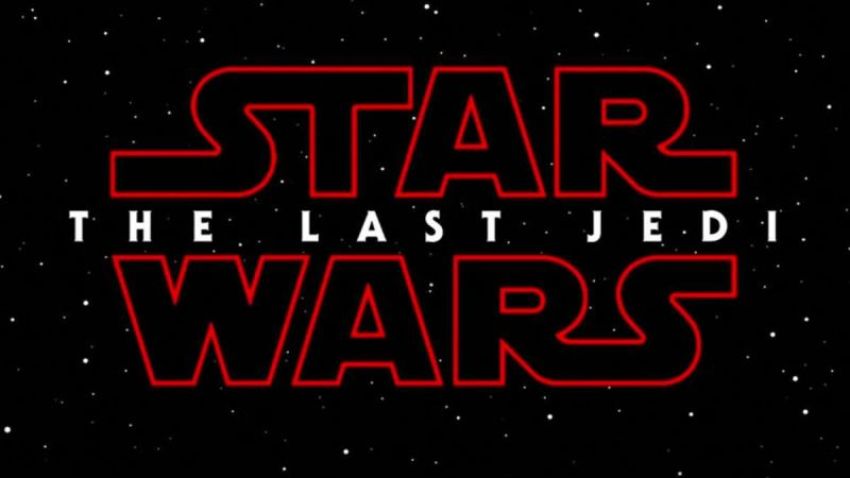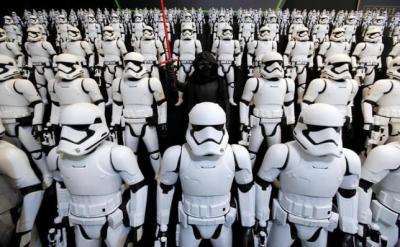'Star Wars,' Spirituality and Scripture

I remember well seeing "Star Wars" in 1977 as an eight-year-old boy. It was my first movie in the theater that was something other than the Disney fare like Herbie the Love Bug. I was awed by the spectacle of it all—as were millions of others. Now as a man firmly ensconced in middle-age I went to see "Star Wars: The Last Jedi" with my 13-year old daughter and, although I was not as overly awed, the movie still kept my interest. It also provided the opportunity to discuss some issues of the latent spirituality in the movie with my daughter.
Spirituality: Then and Now
The "Star Wars" franchise has always trafficked in a kind of indeterminate spirituality. I recently re-read an early review of the original movie by David Fetcho who wrote for the SCP Journal in 1977. Even after 40 years many of his thoughts are spot on. Coming to faith in Christ out of the counter-culture of the 1960's with its experimentation with various forms of Eastern mysticism, Fetcho was able to accurately analyze some of the religious dimensions of the film. In particular, he writes of the Force:
"Rather than being Lucas's definitive statement on absolute reality, the Force is more of a catch-all designation for whatever sort of transcendent reality happens to be expedient to make a given scene in the film work. It interchangeably behaves as an amorphous field of bioplasmic energy, with the detached determinism of the Tao, as personal will intervening on behalf of good against evil. In this way, the Force remains vague enough to satisfy much of the range of metaphysical speculation that humanity has come up with. "Star Wars" tickles our metaphysical idealism with the promise that ultimate reality guarantees that everything will have a happy ending. Simultaneously, it encourages the autonomy of human pride by positing the Force as an energy that we manipulate and use."

This exploration of alternative spiritualities continued in "The Empire Strikes Back" with the training sequence wherein Yoda catechizes Luke in the ways of the Force on the planet Dagobah. Yoda's exhortations to "empty the mind" and his silencing of Luke's persistent questions is a Zen-like quest for touching reality by divorcing the rational element of the mind. Such subtle spirituality is found throughout the "Star Wars" movies and has been commented on by many others.
In the newest entry to the "Star Wars" canon some have noticed a shift in the spirituality developed from the earlier movies. Chaim Saiman has an interesting perspective illustrated by the title of his recent piece in The Atlantic—"Why The Last Jedi Is More 'Spiritual' Than 'Religious'." Saiman notes:
"For at least two generations, the Star Wars saga has served as a kind of secularized American religion. Throughout the series, the Force is a stand-in for a divine power that draws on a number of mystical traditions, representing the balance of good and evil, the promise of an ultimate unity, and the notion that those learned in its ways can tap into the infinite."
But as Saiman notes, in "The Last Jedi" :
"Secular belief system shifts." This shift "presents a more modern take on theology that accords with the 'spiritual but not religious' trend that finds younger Americans to be less interested in organized faith but more open to spiritual experiences." Saiman perceptively notes that Rey is not brought into the Jedi tradition in the ways so far depicted in the series—through the discipline of hard work under the tutelage of a higher-ranking Jedi master. No, Rey intuitively is able to tap into the Force and needs nothing but what is already inside her. This is in accord with modern notions of a hazy spirituality that looks within and eschews "organized religion." As Saiman concludes, "'The Last Jedi' reminds viewers that even a fictional secular religion will likely reflect the spiritual economy of its time."
Jedi Scriptures vs. Christian Scriptures
There was one scene in particular that piqued my interest and became both the topic of our drive home and my meditation the next morning in my devotional time. The scene happens on the planet Ahch-To and Luke is about the burn the uneti tree containing the Jedi sacred texts. Yoda is on the scene watching and when Luke hesitates to light the old Force tree on fire Yoda summons lightning to torch the tree. Luke is aghast but Yoda is indifferent. Yoda speaks of the texts in the following manner, "Page-turners they are not." Yoda also quizzically asks if Luke had read them and by Luke's expression we know he has not. Furthermore, Yoda tells Luke that this sacred library does not contain anything that Rey does not already possess. As an aside, it should be noted (and will be noted by keen-eyed viewers) that in a later scene when Rey is on the Millennium Falcon there is a quick shot of the Jedi texts; so Rey has co-opted them somehow. Nevertheless, as Saiman notes, "Regardless of the books' future, Episode VIII shows the sacrilege committed against the last of the Jedi heritage by two of its greatest known practitioners in the Star Wars universe."
This scene is a mirror reflecting the "spiritual economy" of our time regarding Scripture. Many moderns no doubt look upon the Bible as boring; symbolically honored but unread. Furthermore the real dynamism for authentic spirituality comes from within the human psyche and not from an outside, transcendent source mediated by the written word.
It was with these thoughts in mind that the next morning I found myself reading in 1 Peter. The apostle Peter's perspective on Scripture was entirely different. Consider these words from 1 Peter 1:23-25:
"For you have been born again not of a seed which is perishable but imperishable, that is, through the living and enduring word of God. For, all flesh is like grass, and all its glory like the flower of grass. The grass withers and the flower falls off, but the word of the Lord endures forever. And this is the word which was preached to you."
A few items to consider:
First, notice how the word of God is described—"living and enduring." This is no dead word, but, rather a powerful message that transforms. Second, this word "was preached" to the hearers. It comes from outside the self to bring about a transformation of such a nature as to be characterized by being "born again." Third, this gospel message brought by the apostles is linked with the previous revelation given in the prophets. Peter is able to quote Isaiah 40:6, 8 as applicable to this apostolic word. This is in accordance with what Peter has already written, namely the previous prophets were moved by the Spirit of Christ himself and this was to serve the contemporary generation (1 Peter 1:10-12). Ancient Scriptures, thus, have an enduring, powerful capacity to bring about radical spiritual transformation. Indeed, these Scriptures are "living."
There is one more consideration to note. Peter mentions being "born again" by this enduring word but this is not the first time he has spoken of this concept. In the very beginning of his letter Peter begins with these words:
"Blesssed by the God and Father of our Lord Jesus Christ, who according to his great mercy has caused us to be born again to a living hope through the resurrection of Jesus Christ from the dead."
Born again... "through the resurrection of Jesus Christ" and "through the living and enduring word of God." What's the connection? The resurrection of Jesus is the display of God's power rooted in history proclaiming that Jesus is the Christ and is never to die again. His radical claims have been vindicated and this power flows through human history to transform his people. This historically rooted event is mediated to us through the proclaimed apostolic word.
When we hear this message of the gospel and are brought into alignment with its message we personally experience the resurrection power of God. The connecting concept between both "resurrection" and "word" is that both of these come from outside of us. These transcendent, transforming realities are not found in the inner recesses of our hearts or being. No, rather, they are revelational realities coming from the God who acts in human history both to miraculously raise his Son and to raise us up to newness of life in him. How utterly different this biblical portrait is from the a-historical, word-denying, immanent perspective of "The Last Jedi."
A New Hope
Our culture's exposure to the Star Wars universe began with a movie entitled "A New Hope." The language of hope also fills the most recent edition to the Star Wars saga. Peter, too, speaks of hope throughout his letter. It is precisely because of the otherworldly invasion into our space-time continuum by the Son of God that we have seen the power of God displayed in the resurrection. It is this display of power from the outside that causes us to be born again to a living hope (1 Peter 1:3). The living Scriptures mediate to us this living hope. This living hope we have is that one day the King, who came in humiliation, will come again in glory. It is upon this coming grace at the revelation of Jesus Christ that we "fix our hope" (1 Peter 1:13). And it is this hope to which we, as the church, are called to testify and defend (1 Peter 3:15).
Richard Klaus graduated from Phoenix Seminary and is a former pastor. He is currently the Ratio Christi (ratiochristi.org) Chapter Director for the campus of Glendale Community College (AZ).



























